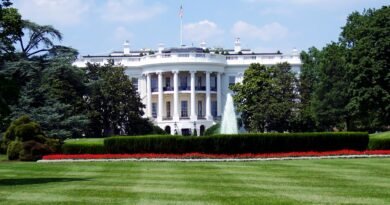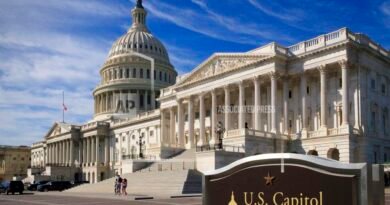The Trump Election and Its Impact on People of Color: A Personal Reflection
The continuation of Donald Trump’s presidency through 2028 stirs a spectrum of emotions and carries profound implications, particularly for people of color, especially Black individuals, whose identity is deeply tied to the visible markers of our skin and physical features. While I cannot claim to speak for everyone, I can share my personal experience and the weight that my racial identity brings to these elections for me and my son.
By the end of Trump’s second term, my son will be 12 years old, just beginning to grasp the significance of elections and their impact on his future in a country often celebrated as the “Land of the Free.” For now, his understanding is simple: he recognizes the choice between Kamala Harris, the historic first woman of color to serve as Vice President, and Donald Trump, the former president seeking to shape the nation’s trajectory for another term. Through his innocent yet perceptive lens, he sees a race of “red versus blue,” with the “red wave” sweeping the country in an unprecedented manner as depicted on the “magic wall” of CNN or Fox News. Despite his limited understanding of terms like “collegiate delegates,” he intuitively senses the gravity of the moment, recognizing that the decisions made in these elections will ripple across his generation’s future. The outcome, etched in vivid red across the map, seemed inevitable, a stark reminder of the forces at play and the challenges that persist.
This election was unlike any other in my lifetime. As a Black man, a father, and someone who grew up under vastly different circumstances from most Americans or those privileged to live in the so-called Western world, the stakes felt deeply personal. As a university professor with a deep understanding of the dynamics of politics, elections, and leadership — and their socioeconomic and political impacts, particularly in a global superpower like the United States — I frequently encourage my students to embrace their civic duty to vote. Living in a mature democracy where every vote counts is an extraordinary privilege, one that is far from guaranteed in many parts of the world.
For immigrants, especially those of us referred to as “people of color,” voting represents not only an opportunity but a stark contrast to the autocratic systems we fled. In the countries many of us came from, leadership was often imposed by autocrats backed by foreign patrons, leaving no room for public participation. When we found ourselves in refugee camps, the notion of democracy and leadership deteriorated further — life there rendered us landless, rightless, lawless, and alien, with no voice in shaping our future. To now witness and participate in a democratic process in the United States highlights the profound privilege of voting and underscores the right to take part in public affairs, a cornerstone of democratic governance. For those of us who have lived without such rights, this privilege carries immense responsibility and meaning.
Growing up without the privilege of voting
My journey to the United States, like that of many immigrants, was marked by immense challenges and deep traumas. I survived the horrors of conflict, traversing the perilous Congolese jungle where life-threatening dangers lurked and rivers ran red with the blood of loved ones, victims of Western-backed rebels hunting us like guinea pigs. Enduring starvation in refugee camps across Africa, I lost almost everything, including my sense of safety and, at times, nearly my own life.
These harrowing experiences left indelible scars, yet they also serve as powerful reminders of the transformative power of democratic institutions, good governance, and patriotic leadership. When some of us finally reached the shores of the so-called “Land of the Free,” a nation celebrated as a beacon of democracy, we struggled to fully embrace the privilege of voting and the miracles brought by these democratic institutions. This struggle stemmed from the fact that the institutions we had known, though labeled “democratic” on paper and in the media, were a façade — nothing more than tools of oppression. In our homelands, elections were hollow rituals, with nothing functional or fair about the process. For many of us, learning to trust and participate in true democracy has been as much a journey as the one that brought us to this nation.
The reasons for immigrant voter apathy are deeply rooted in the political realities of the countries many have fled. For immigrants, particularly those from nations ruled by entrenched dictators, voting often feels futile. In these countries, elections are routinely manipulated to secure the survival of local autocrats while safeguarding the interests of imperialist powers that installed or continue to support them. Nations such as Uganda, Rwanda, Equatorial Guinea, Gabon, Cameroon, and Eritrea exemplify this, with leaders clinging to power for decades despite the charade of expensive, Western-funded elections that mock democratic values. These systems breed profound disillusionment: casting a vote only to see the same dictator emerge victorious, delivering hollow promises, conditions people to believe their voices hold no power.
When immigrants arrive in democratic nations like the United States, this ingrained skepticism persists, compounded by the absence of civic education tailored to first-time immigrant voters. Without resources to help them understand their electoral rights and the broader significance of voting, many struggle to embrace participation in a system that feels foreign. Having never witnessed the tangible benefits of elections in their homelands, they carry a sense of “electoral apathy,” which often extends to limiting their political engagement in their new home, therefore lacking their involvement in shaping the political future of their communities.
Even in the United States, where democracy is robust and celebrated, past traumas among new immigrants continue to cast a long shadow. Many of us struggle to trust the process or feel motivated to participate, carrying a persistent belief that our voices and our ballots do not truly matter. Adjusting to life in a new land comes with a cascade of challenges: a new culture, unfamiliar people, a different political system, and a completely redefined way of life. These profound changes often leave us feeling disconnected, relegating ourselves to the label of “others” — a term society imposes and we unconsciously accept. This detachment leads many to believe that civic duties, like voting, are better left to those perceived as “more American,” while we focus on survival: ensuring our children succeed in school and juggling multiple low-wage jobs to make ends meet.
Only a fortunate few, equipped with education and exposure to concepts like governance, transparency, leadership, accountability, and the functioning of democratic institutions, truly understand the immense value of the right to vote. Yet, even among this group, lingering prejudices and past fears often hinder full participation. However, this year I made a deliberate choice to overcome those barriers and participate in what felt like a historic election. There was a palpable sense that its outcome would profoundly shape the nation’s future. It required a different mindset, a renewed sense of responsibility, and a commitment to engage in ways many of us never had before.
Why this election felt different to me and many other U.S. citizens
In my view, this election felt uniquely different, not only to those of new immigrant backgrounds or communities of color but also to the broader population across the United States and even globally. For me, it stood out for several reasons, each of which added layers of complexity to the decision-making processes for many voters. These complexities included:
- A historic return: For the second time in U.S. history, a former president sought to return to office just four years after being voted out by the same electorate. Donald Trump’s campaign generated an intensity surpassing even his initial run.
- Representation at the highest level: Vice President Kamala Harris represented a groundbreaking candidacy. As a woman of African and Asian heritage, her potential ascent to the presidency would mark the first female president of color in U.S. history. This milestone deeply resonated with many communities seeking representation and equity in leadership roles.
- Geopolitical challenges: This election unfolded against the backdrop of unprecedented global conflicts that directly impacted the United States. For me, these conflicts created a sense of urgency to elect leaders capable of navigating complex international dynamics.
- Domestic issues: At home, I believe, two critical issues dominated voter concerns: U.S. households’ financial struggles and immigration and border security. Rising energy prices and unaffordable food costs led voters like myself to question the administration’s ability to address these challenges. Meanwhile, there was growing concern among some about prioritizing undocumented newcomers during an economic crisis when many citizens were struggling to make ends meet.
- Divisive campaign priorities: Issues such as abortion rights, social justice, and foreign policy felt disconnected from the immediate concerns of many Americans like me; the defining issues of this election were the rising cost of living and the economic uncertainties impacting daily life — not ideological concerns.
I believe that this election was a convergence of historic milestones, global conflicts, and urgent domestic challenges. The stakes felt higher than ever, leaving a profound and lasting impression.
Wrestling with my decision
As an independent voter, I found myself deeply torn between competing priorities. On one hand, I was inspired by the historic nature of Kamala Harris’s candidacy and the ideals she represented, such as social justice, human rights, socioeconomic equality, and the groundbreaking significance of being the first woman of color to hold her position. However, I couldn’t ignore the pressing economic struggles my family and millions of others were enduring. From the campaigns, it seemed there was little hope for a promising future under her leadership to address the issues people like me — and millions of Americans — were facing.
On the other hand, there was a candidate whose rhetoric, intentionally or unintentionally, emboldened those who seemed to harbor animosity toward people like me or others who looked like me. Yet, despite this, his message offered a glimmer of hope that the socioeconomic issues affecting millions of Americans, including my own, might be addressed, and that tomorrow could hold better prospects. I spent weeks deliberating, carefully weighing the pros and cons of each candidate, trying to reconcile the historic and ideological with the immediate and tangible challenges before casting my vote as I considered a host of factors:
- Could Trump bring the Russia-Ukraine conflict to a peaceful resolution?
- Would his policies address the economic challenges at home?
- Was Harris the right leader to navigate the complexities of domestic and global issues?
- How would either candidate impact my values as a conservative Christian, my son’s education, and the social justice issues I care about?
Ultimately, the economic realities of inflation and border security carried the most weight for me. When I cast my vote, I did so knowing that my decision would have long-term implications, not just for me but for my son and millions of others who looked like him as well.
The fallout of my decision
Voting for Trump was a decision I did not take lightly, fully aware of the social and racial tensions his presidency might reignite. My fears became reality within days of the election results. A friend in Texas received text messages telling him and his family to “get ready to pick cotton.” In Columbus, Ohio, neo-Nazi marchers paraded through the streets, waving swastika flags, chanting racial slurs, and even carrying or wearing crosses — an especially troubling sight for me as a Christian. Having worshiped in churches around the world, particularly in the Western world, I have observed a perplexing contradiction: some of the most overtly racist individuals are also deeply religious. This contradiction clashes with the God my mother taught me about, the God I worship — a God of love, diversity, and inclusion, who created all people in His image. It is deeply disheartening to see His name invoked to justify hatred, especially against people whom both faith and science affirm were the first to walk this planet.
A sense of regret set in as I wondered whether I had made the right decision, but I recognized that regardless of my vote, millions of others felt similarly — that a shift was necessary to challenge Democrats who seemed to take certain voters’ support for granted. It was a way to send a message that no political party owns anyone’s allegiance and that their values should not be imposed on those who have historically voted with them.
This election underscored the socioeconomic and political complexities of being a person of color in America, forcing me and others who are classified as “other” to confront the intersection of our identities, values, and civic responsibilities as voters. It highlighted the difficult balancing act of prioritizing what matters most to us while grappling with the tensions and unnecessary scrutiny tied to our identity. It served as a reminder of both the privilege of living in a democracy and the unique weight our skin color carries when making political decisions.
While others may take such decisions for granted, I must carefully consider how my choice will affect not only the political landscape but also how my identity will be perceived and treated as a result. Despite these challenges, I remain hopeful — hopeful that our nation can find common ground, that leaders will address pressing issues without rhetoric that harms those viewed as “others,” and that everyone will feel valued as human beings rather than being judged by their skin color, geography, or demographics. I also hold onto the hope that those who perpetuate racial hatred and xenophobia will reread their holy texts and recognize that while human systems of injustice may suggest otherwise, God is a deity who delights in diversity and inclusion.
Global Citizen
This writing has been verified, edited and published by our editorial staff at the request of the writer, who wishes their identity to remain protected to ensure their privacy and security.
Thank you to Jessica Day for their inspired edits on the piece.




